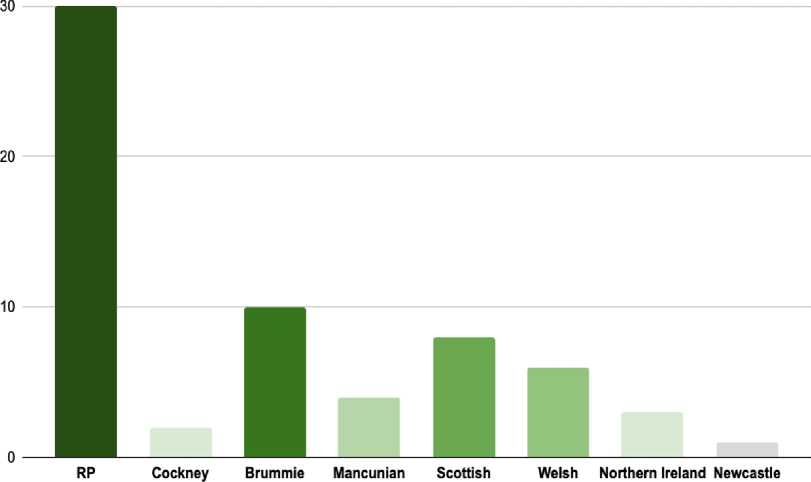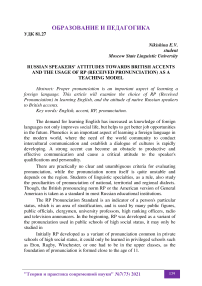Russian speakers’ attitudes towards British accents and the usage of RP (received pronunciation) as a teaching model
Автор: Nikishina E.V.
Журнал: Теория и практика современной науки @modern-j
Рубрика: Образование и педагогика
Статья в выпуске: 7 (73), 2021 года.
Бесплатный доступ
Proper pronunciation is an important aspect of learning a foreign language. This article will examine the choice of RP (Received Pronunciation) in learning English, and the attitude of native Russian speakers to British accents.
English, accent, rp, pronunciation
Короткий адрес: https://sciup.org/140276247
IDR: 140276247 | УДК: 81.27
Текст научной статьи Russian speakers’ attitudes towards British accents and the usage of RP (received pronunciation) as a teaching model
The demand for learning English has increased as knowledge of foreign languages not only improves social life, but helps to get better job opportunities in the future. Phonetics is an important aspect of learning a foreign language in the modern world, where the need of the world community to conduct intercultural communication and establish a dialogue of cultures is rapidly developing. A strong accent can become an obstacle to productive and effective communication and cause a critical attitude to the speaker's qualifications and personality.
There are practically no clear and unambiguous criteria for evaluating pronunciation, while the pronunciation norm itself is quite unstable and depends on the region. Students of linguistic specialties, as a rule, also study the peculiarities of pronunciation of national, territorial and regional dialects. Though, the British pronouncing norm RP or the American version of General American is taken as a standard in most Russian educational institutions.
The RP Pronunciation Standard is an indicator of a person's particular status, which is an area of stratification, and is used by many public figures, public officials, clergymen, university professors, high ranking officers, radio and television announcers. In the beginning, RP was developed as a variant of the pronunciation used in public schools of high social status, it may only be studied in
Initially RP developed as a variant of pronunciation common in private schools of high social status, it could only be learned in privileged schools such as Eton, Rugby, Winchester, or one had to be in the upper classes, as the foundation of pronunciation is formed close to the age of 11.
However, researchers say that 9-10% of the privileged population, with some regional varieties, and a stricter estimate of just 3% of the population, speaks RP. Most educated people speak with a slight regional accent, indicating their place of birth, permanent residence, education, social status (so called "modified RP" or "near-RP"). Other RP designations such as Queen's English, King's English, U-English, BBC English, Oxford English and Well-Bred English also appear in the literature and in common speech.
The British pronunciation norm RP is adopted as the standard for teaching English at Moscow State Linguistic University and other Universities in Russia . It can be assumed that it is easier for speakers perceive is the accent that they have studied and to which their ears are tuned. The attitudes survey conducted at MSLU in 2021 showed that RP is the most attractive and pleasant-sounding accents according to native Russian speakers learning English as the second language (see Figure 1). The majority of respondents studied English language in Russia and were accustomed to RP, though they did not know that such accent existed. They described it as intelligent, posh, smooth and comprehensible . Several respondents claimed that they heard this accent in English classes at school.
The most attractive British accents according to native speakers of Russian

Figure 1. The most attractive British accents according to native speakers of Russian.
The high ranking for Received Pronunciation in the sociolinguistic survey conducted in Russia correlates to a comparable research carried out among Polish-born students studying English as a second language in the United Kingdom.
However, the modern British pronunciation norm is losing its prestige and is perceived as archaic in certain contexts. This is why there is an urgent need to explore and show learners of English other varieties that have the prerequisites for claiming the status of a new standards of pronunciation in the future.
Список литературы Russian speakers’ attitudes towards British accents and the usage of RP (received pronunciation) as a teaching model
- Carrie, Erin and McKenzie, American or British? L2 speakers' recognition and evaluations of accent features in English. Journal of Multilingual and Multicultural Development, 39 (4). pp. 313-328., 2017
- Wells, J. C. Accents of English (3 vols.). Cambridge: Cambridge University Press, 1982


